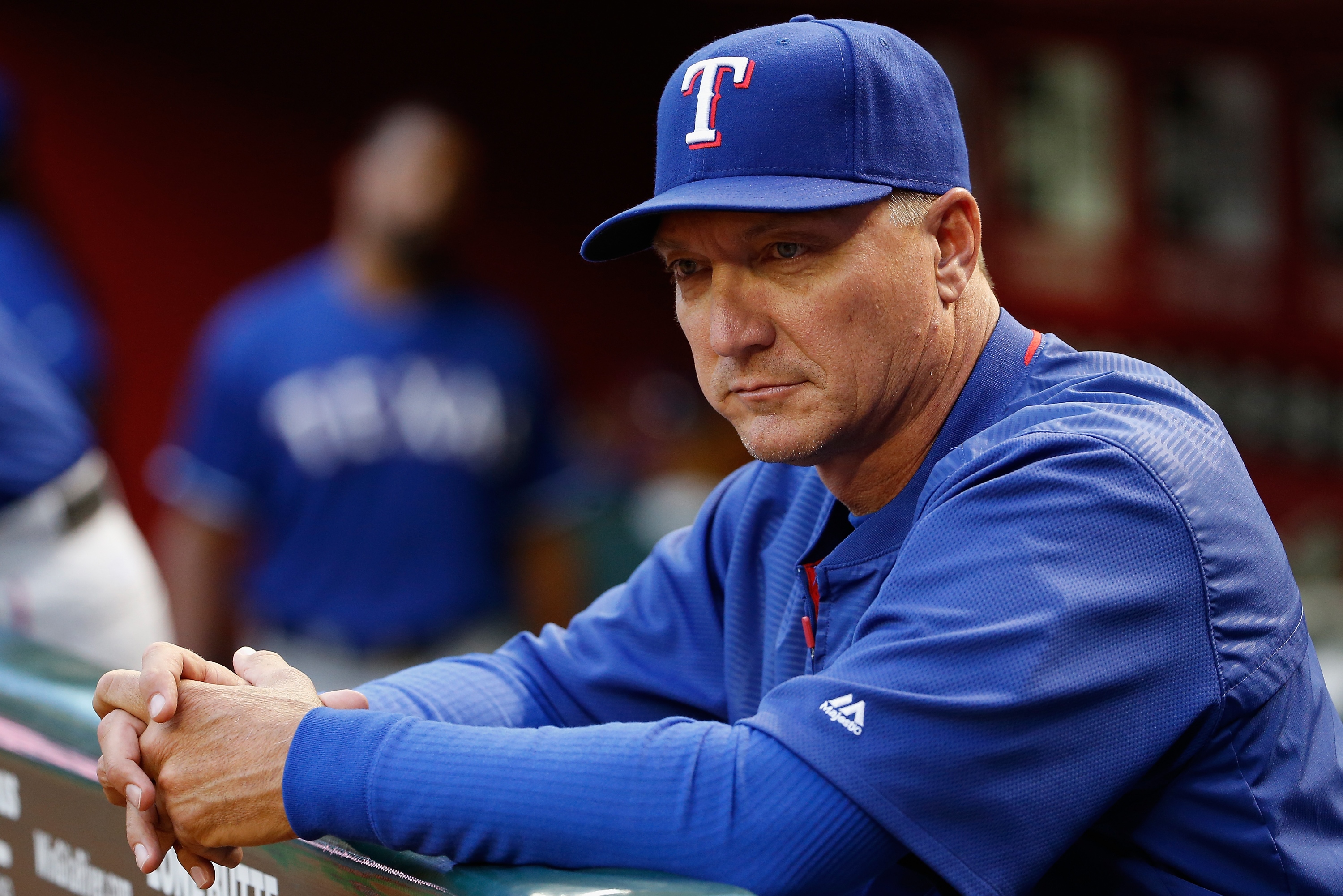Manager of the Year 2015: Sizing up the finalists
After kicking off awards season with the rookies on Monday, MLB will honor the game’s top decision-makers with the Manager of the Year award on Tuesday.
On the AL side at least, the award could actually serve as an extension of the Rookie of the Year award. Two of the year finalists — Texas’ Jeff Banister and Minnesota’s Paul Molitor — were in their first season as a big league skipper, while Hinch was in his first season with Houston.
There’s a strong case to be made for all threes managers, as all three teams exceeded expectations. Both Banister and Hinch led their teams to the playoffs and actually came within one victory of meeting each other in ALCS. Postseason results don’t matter here, of course, but it speaks to the excellent work of both. Molitor’s accomplishments can’t be discredited though. The Twins competed all season with perhaps the least-talented roster in the AL Central coming in to the season.
[Related: Cubs slugger Kris Bryant wins NL Rookie of the Year award]
On the NL side, Joe Maddon looked right at home in his new league, leading the Cubs to 97 victories. In most seasons, that’s a good enough mark to win a division. However, St. Louis’ Mike Matheny had the Cardinals clicking all season despite numerous injuries to key players. Not to be outdone is Terry Collins, who lead the Mets to their first division championship since 2006 despite the NL’s worst offense through July and a bullpen that was short-handed all season long. It feels like Collins accomplished the most given his team’s set up. Managing successfully in New York won’t hurt his cause either.
That’s the quick rundown. Now here’s a breakdown of the three finalists in each league to further whet your appetite. The winners will be announced Tuesday in an MLB Network special that begins at 6 p.m. ET.
AMERICAN LEAGUE
Jeff Banister — Texas Rangers
In brief: The Rangers went from worst-to-first in the AL West, winning the division on the season’s final day despite another injury-plagued season. Texas was immediately dealt a potentially crushing blow in spring training when ace Yu Darvish went down with Tommy John surgery. The Rangers not only survived Darvish’s loss, they remained relevant all season and then surged down the stretch to secure their postseason berth.
Case for: In addition to losing Darvish, the Rangers were also without Jurickson Profar for the season and Adrian Beltre and Derek Holland for significant chunks. The team’s depth was tested, but Banister’s squad was not derailed. They displayed remarkable resilience and relentless fight, which reflects well on the manager. The Rangers finished with 88 wins, a 21-win jump from 2014.
Case against: Banister struggled managing his bullpen, particularly during the Rangers’ final regular-season series against the Angels. Banister exhausted his bullpen in back-to-back losing efforts leading up the season finale, only to be saved by Cole Hamels’ complete game in the division clincher.
A.J. Hinch — Houston Astros
In brief: Despite a failed stint in Arizona five years earlier, Hinch proved to be the right fit at the right time with Houston’s long rebuild nearing completion. After six straight losing seasons, Hinch not only got the Astros back on the winning track, he helped guide them to the postseason for the first time since 2005.
Case for: The Astros are a young and talented team with a bright future, but that’s about all people were willing to say before the season. Hinch helped maximize his players’ potential to create a very confident team. Even when things went poorly, the bottom never fell out on the Astros.
[Related: Astros shortstop Carlos Correa wins AL Rookie of the Year award]
Case against: Houston controlled the AL West for most of the season, but fell short at the end. It’s not necessarily a mark against Hinch, but it’s likely enough to sway the vote in Banister’s favor.
Paul Molitor — Minnesota Twins
In brief: Moiltor had big shoes to fill with Ron Gardenhire gone and a tough division in which to make his mark. He succeeded, leading Minnesota to 83 wins after four straight seasons of at least 92 losses. The Twins were not eliminated from postseason contention until the final weekend.
Case for: The Twins rotation was less than daunting, especially with Ervin Santana suspended the first 80 games. The team’s batting average was bottom five in MLB as well, but the Twins still managed to compete day in and day out. Improved fundamentals certainly helped keep them in games, as did a renewed focus that Molitor established right away in spring training.
Case against: Unlike Banister and Hinch, Molitor couldn’t get his team completely over the hump. There’s not a lot separating this group, but that’s probably enough to make Molitor the clear No. 3.
NATIONAL LEAGUE
Joe Maddon — Chicago Cubs
In brief: Maddon picked up where he left off with the Tampa Bay Rays. Recognized as one of baseball’s brightest minds, greatest motivators and truly fearless managers, Maddon helped the young Cubs reach their full potential. He walked into a great situation, sure, but his impact is undeniable.
Case for: Maddon’s lineup was filled with rookies. High upside rookies, but still rookies. His starting rotation was not deep beyond Jon Lester and Jake Arrieta. His bullpen was a work in progress all season long. Yet the Cubs still finished with the third best record in baseball. The Cubs young core is lucky to have him around.
Case against: Maddon’s ride was a little smoother than his counterparts. He didn’t deal with the same injuries as Matheny, and he wasn’t faced with the same drama as Collins.
[Related: Yogi Berra and Willie Mays to receive the Presidential Medal of Freedom]
Mike Matheny — St. Louis Cardinals
In brief: The Cardinals won 100 games playing in baseball’s best division, all while dealing with a litany of injuries to key players. The Cardinals have now reached the postseason in each of Matheny’s four seasons, including three straight division championships.
Case for: The Cardinals had everything working against them. The Pirates and Cubs were both improved, winning 98 and 97 games respectively. The injuries were relentless, with Adam Wainwright, Matt Holliday, Matt Adams, Jon Jay and Yadier Molina all missing significant time. Yet the Cardinals remained unfazed under Matheny’s watch. The next man approach worked again and the team never missed a beat all season.
Case against: Matheny is still shaky as an in-game strategist. There were games the Cardinals won seemingly in spite of Matheny and his decision-making.
Terry Collins — New York Mets
In brief: The Mets pulled away to win the NL East over the heavily favored Washington Nationals. Not bad for a team with numerous flaws early in the season and a manager who was more likely to be fired six months ago than he was to end up on this list. They overcome a lot, and they did it together.
Case for: Collins never his lost players. As cliche as it sounds, the Mets never fell apart during stretches that easily could have shredded their confidence and sent the team in a different direction. Elite starting pitching helps, but even there Collins had to walk a fine line in managing workloads (Example: Harvey, Matt). He did an excellent job.
Case against: Sandy Alderson’s trade for Yoenis Cespedes undeniably lit a spark under the team. Would Collins and the Mets have achieved the same success without him?
More MLB coverage from Yahoo Sports:
– – – – – – –
Mark Townsend is a writer for Big League Stew on Yahoo Sports. Have a tip? Email him at [email protected] or follow him on Twitter! Follow @Townie813



